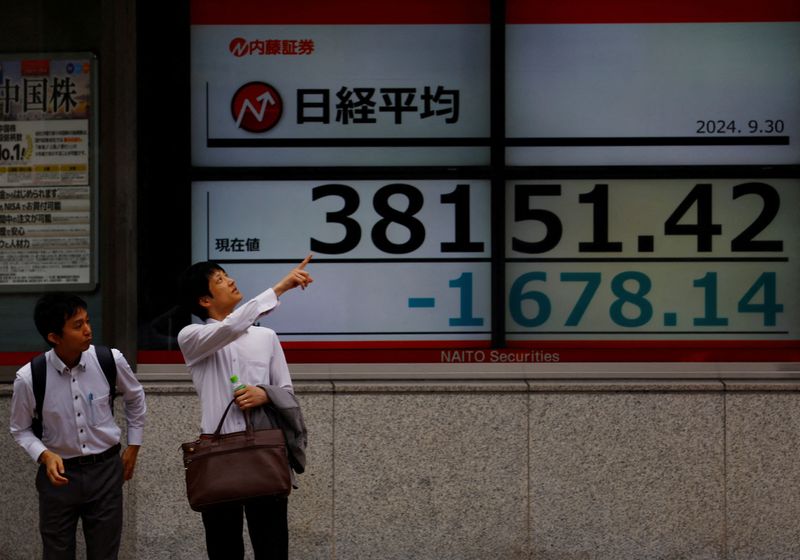Stocks rise ahead of action-packed week; Japan election sparks turmoil
By Amanda Cooper
LONDON (Reuters) - Global stocks rose on Monday, ahead of a week stacked with earnings from Wall Street's "Magnificent 7", while the yen sank after an election in Japan thrust the country into political turmoil, and oil slid as tensions in the Middle East ebbed.
The dollar, which is heading towards a 3.6% monthly rise against a basket of major currencies in October, hit a three-month peak against the yen at 153.885, after Japan's ruling Liberal Democratic Party (LDP) lost its parliamentary majority.
Oil prices fell by as much as 5.34% after Israel's response to an Oct. 1 Iranian missile attack focused, so far, on missile factories and other sites near Tehran, rather than on refineries or nuclear targets.
U.S. stock index futures pointed to an upbeat start on Wall Street later, up 0.5-0.7%, while Europe's STOXX 600 rose 0.4%, as airline stocks drew strength from lower fuel prices.
With the U.S. presidential election just over a week away and a key read of employment on Friday, investors were wary of tugging stocks or bonds too far in one direction or the other.
"There’ll be plenty to test the market nerves with this week's bumper set of data releases, including U.S. payrolls on Friday, and earnings reports, with five of the Magnificent 7 reporting. Meanwhile, the tight U.S. election campaign will enter its final stretch," Deutsche Bank strategist Jim Reid said.
The "Magnificent Seven" are the largest U.S. companies by market value. The five set to report earnings this week are Google parent Alphabet (NASDAQ:GOOGL ), Microsoft (NASDAQ:MSFT ), Facebook (NASDAQ:META ) owner Meta, Apple (NASDAQ:AAPL ) and Amazon (NASDAQ:AMZN ).
"One market fear that has eased over the weekend is escalation risks in the Middle East. This comes as overnight into Saturday Israel carried out retaliatory strikes against Iran, but with these targeting military facilities and avoiding oil or nuclear installations."
In Japan, Tokyo's Nikkei closed up 1.8%, after initially dipping following the weakest election result since 2009 for the LDP, which has governed the country for most of the post-war era.
The party, with junior coalition partner Komeito, won 215 lower-house seats in Sunday's election, public broadcaster NHK reported, well short of the 233 needed for a majority.
The yen weakened sharply, leaving the dollar up as much as 1% earlier in the day, since investors figured any government that emerges is likely to make a dovish shift in economic policy. [.T][FRX/]
"The markets are likely to think this means more trouble for the yen with 155 the first target and (the finance ministry's) line in the sand at 160," said Bob Savage, head of markets strategy and insights at BNY in a note.
Nomura analyst Yusuke Miyairi also expects the Bank of Japan, which reviews policy on Thursday, will be more dovish and that will hurt the yen.
RISING DOLLAR
Broader currency markets were steady, leaving the dollar on course for its largest monthly rise in 2-1/2 years as signs of strength in the U.S. economy and the prospect of a Donald Trump presidency have driven up U.S. yields.
While markets have started pricing in a second Trump administration in recent weeks, Vice President Kamala Harris is leading Trump nationally by a marginal 46% to 43%, a recent Reuters/Ipsos poll showed.
Benchmark 10-year Treasury yields are up nearly 45 bps this month, partly down to the growing chances of a Trump win, but also as U.S. data has shown the economy remains resilient and, as such, interest rates could fall a lot more slowly than many thought just a few weeks ago.
Friday's monthly employment report could reinforce that view.
The 10-year Treasury note was last yielding 4.8%, up 4.8 bps on the day.
In Europe, euro zone government bond yields edged up in line with Treasuries. French 10-year bonds were mostly steady at 3.05%, shrugging off a decision by ratings agency Moody's (NYSE:MCO ) on Friday to lower its outlook on French sovereign debt.
Gold, which hit record highs last week, hovered just shy of those levels at $2,733 an ounce.
Source: Investing.com
